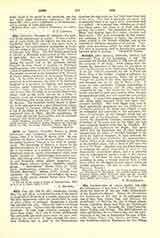

Airoli (or AYROLI), GIACOMO MARIA, a Jesuit Orientalist and Scriptural commentator; b. at Genoa, 1660; d. in Rome, March 27, 1721. He was professor of Hebrew in the Roman College, and later succeeded Cardinal Tolomei in the chair of controversy. His knowledge of Hebrew is shown by his Hebrew translation of a homily of Pope Clement XI. He is the author of a number of dissertations on Scriptural subjects, mostly chronological, which were highly thought of. Sommervogel enumerates fourteen, chief among which are: (I) “Dissertatio Biblica in qua Scripturae textus aliquot insigniores, adhibitis linguis hebraea, syriaca, chaldaica, arabica, graeca, … dilucidantur” (Rome, 1704); (2) “Liber LXX hebdomadum resignatus, seu in cap. IX Danielis dissertatio” (Rome, 1713), several times reprinted; (3) “Dissertatio chronologica de anno, mense, et die mortis Domini Nostri Jesus Christi” (Rome, 1718).
F. BECHTEL

